The Good Life?
This is Sing’s eldest daughter, showing off her handbag outside the house her father built.
Her name means “Be Loved”. Be Loved’s younger sister is called “Be Happy” and the baby’s name means “General”. Appropriately since, like many youngest children, she isn’t shy about asserting her needs.
Sing chose his daughters’ names before he was married — late for Laos, at twenty-eight. His wife and he were working in business administration in Vientiane, the capital, when mutual friends set them up on a blind date. On their second date, five years ago, they married.
Their eldest is four and a bit. You do the maths.
We spent the last two days with Sing, trekking the Nam Ha protected area near Luang Nam Tha in northern Laos, and he invited junior to his home village to meet his daughters.
“When I was working in marketing administration, I worked six days a week. Out of seven, I had only one day off, the Sunday,” he says. “I never saw my family. Then the company moved to a different province. And for one or two whole months I would not see my daughters.”
So he chucked in the career for which he had studied for seven years. Studied English. And became a guide. He works three days a week, on average, and gets to watch his little daughters grow.
The village he lives in is a largish one. About five hundred families. Several hundred kids. A good swathe of whom, when we visit, are chasing each other in and out of the houses, helping junior in his quest to capture a chicken in a bamboo wicker hen-house, gawping, slightly timidly, at the giant Westerners who have lumbered into their midst, or, in the case of this little one, mugging for my camera.
Giant and, in my case, rather smelly Westerners. We’ve covered 40-odd kilometres of fairly constant up and down in sauna-esque conditions over the last two days and the baby lasts about a nanosecond in the crook of my arm before mewling politely, if insistently, for her mother.
Sing and his wife are an interesting couple. Both, clearly, very happy with their three young daughters, planning two more, and overjoyed to have found each other so — by Lao standards — late in life. Also both meditative, serious-minded people.
She speaks about as many words of English as I speak words of Lao, so I talk mainly to Sing. Both of them come from the Hmong tribal minority, whose language is similar to Chinese. There are Hmong scattered throughout northern Laos, northern Vietnam, and the Chinese border region. Around Luang Namtha they are one of the larger tribal minorities.
One of the few (by Western standards) possessions Sing keeps in the big and beautiful house he built is a qeej, a musical instrument he translates as a “cannon”. It’s a large mouth organ with six curving bamboo pipes, which the Hmong play at weddings, funerals and New Year. You can inhale, exhale or sing into the mouthpiece, and stop the pipes individually or multiply to produce a tone.
“Did it belong to your father?” I ask.
“No,” he says. “I bought it six years ago. Very few Hmong people play it now. But we need people to play, to keep the music alive.”
There are three different melodies that are played at funerals, Sing says. One for babies, one for people in their middle years, and one for the old. Rather than bring bad luck on the house by asking him to play a funeral song, I ask him to play me a New Year song.
It’s an unearthly, very ghostly sound, like a more breathy and hollow accordion, with a tonality that’s other-worldly. It bears absolutely no relation to the pentatonic or octave scales I’m familiar with. Schonberg, I think, would have loved it. Z plays it, happily as Larry.
Communism has been unkind to most of South-East Asia, but here in rural Laos, where it meets agrarian animism and ancient traditions, it seems to work very, very well.
When Sing and his wife married, they left Vientiane province to come here. They identified a plot of land in the village. Sing went to the chief of the village to ask his permission to build there. He bought the bricks, bought some timber, bought corrugated iron and gathered bamboo. And built himself a house.
“You don’t need to buy?” I ask.
“No, no,” he says. “In the city, you need to pay money. In the country, you just ask if you can build a house. You ask if you can farm some land or plant some trees.”
They keep chickens and pigeons. They have no pigs, no farmland. “Farming is a hard life,” says Sing.
The village guide who trekked with us farms. He is up at 2 or 3am to tap his rubber trees, then up to the dizzyingly steep patch of land he and his wife cleared when they married, while his daughters gather forest plants as fodder for the pigs.
He grows, however, everything that his family needs. From tomatoes, pumpkins, aubergines, melon and papaya through to lemongrass, ginger, culantro, holy basil and chilli, from rice to traditional herbal cures. They sell spare chillis and the occasional chicken at the market, but essentially it is subsistence.
It does seem, from the villages we visit, that more than land is held in common. Everybody looks after the children, who play happily together and run in and out of each other’s houses as if they were in common. Doors are always open. (Laos has one of the lowest crime rates in the world.) Festivals are shared. The village pigeons all share a dove cote.
When Sing talks about the economic benefits of rubber trees, he says, “For my village, the income is 100,000 dollars in one year,” rather than identifying an individual who makes an impressive living from it, as folk would in Thailand or the West.
In the West, happiness, or even contentment, is a struggle. We medicate for the lack of it. Unhappy adolescents take out their rage in crime. We believe we are entitled to a million and one possessions, laptops, HDTVs, hundred-dollar moisturisers… Our children go through lives deluged in streams of plastic crap. To see people living so contentedly with so little is a beautiful thing.
The handbag, by the way, is furry. And a source of intense pride.

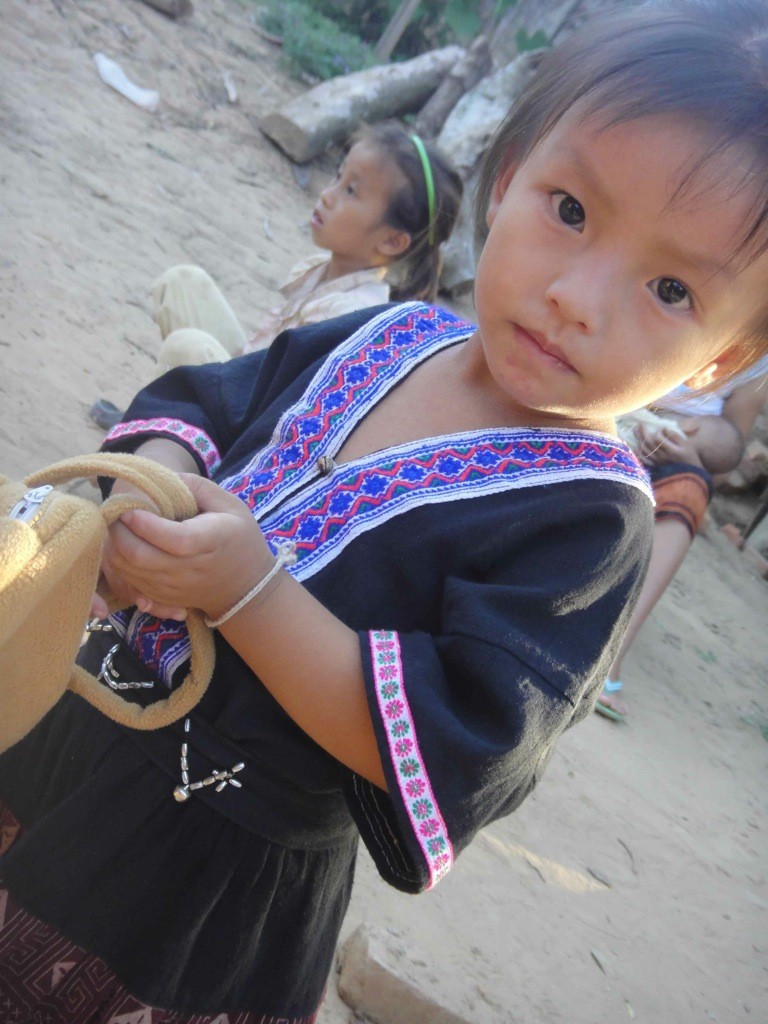
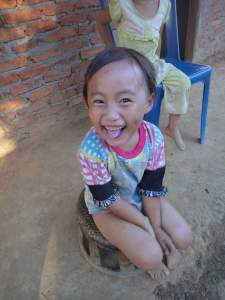
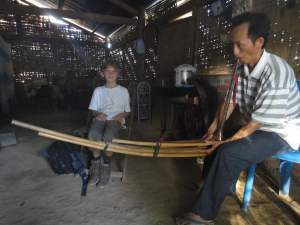
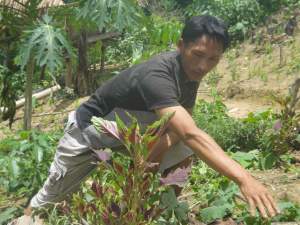
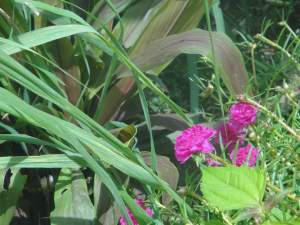
Well a girl has to have her handbag…Hi! Sounds like you’re both having a marvelous time- you must be getting very fit. And yes it must be nice to take a step away from the consumerist “must haves” that seems to be so prevalent back here- I am hoping that when we move back to NZ things are going to be slightly more laid back- not counting on it, just hoping! Laouena missing Zac- will get her to email him! xx Kate
Are you decided on the move, then? When are you going? I am thinking of basing ourselves in Spain eventually so we can continue to travel a LOT: 300-euros a month for a 2-bedroom house somewhere pretty feels a hell of a lot more do-able than the whole London thing, and is closer to friends and family than LatAm, plus the boy ends up bilingual… We are six hours ahead of you at the moment, so if you and Laouena are about to Skype after school we may well both be online. We are having a very quiet day. My thighs are aching. Which is odd. As it was my calves and knees that felt the burn on the way up and down (respectively).
beautiful story
Thank you! It was a beautiful couple of days.
Well we could all learn something here about quality life – happiness is healthy beautiful children, enough food to eat and a few rubber trees
All the way over in Laos and still puzzling over the same questions. How to reconcile work and quality family time….
Yes. I found it really odd that someone who struck me as so distant from the West — someone I met in the context of speaking a tribal language (in addition to Lao), teaching bird calls, spear fishing etc. — should actually have dropped out of their answer to the rat race to do so.
Just discovered you blog and an working my way through! We are living in ubud and getting ready to travel with a 12 and 16 year old.was Laos affordable? We do need Internet for my husband’s work, at least every few days. Is that doable? Would you recommend Laos? Also thinking about India. Any experience there?
Thanks for the blog. It is full of great info and lots of heartfelt life!
Hello! We’re huge fans of Ubud and when we settle that’s probably where we’ll land…
Laos is extremely affordable — cheaper than Bali for everything — and the larger towns have internet. You’ll occasionally get citywide outages for a day or so but there’s good places to work in the Scandinavian Bakery (eg), while many guesthouses offer it too. You won’t find it in small towns, but even somewhere like Tha Khaek has it, let alone Luang Prabang. The internet is not bad, either. Similar level of quality to Ubud, and without the restrictions on using Skype.
I’d highly recommend it as a place to explore more of — one reason why we keep coming back…
What’s the medical herb he was tending? The one with the red stripes, I really want to know someone please tell me.